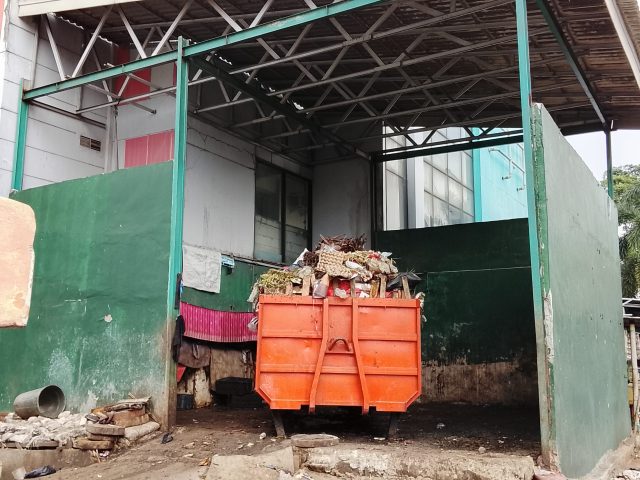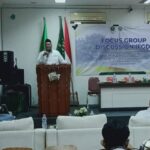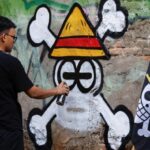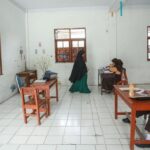BEKASI CITY – The existence of the temporary waste disposal site (TPS) at Pondokgede Market has been complained about by Pondokgede Hospital. The reason is that the foul odor from the waste strongly disrupts the sense of smell and activities of visitors and employees of the hospital owned by the Bekasi City Government.
Observations in the field show that the market’s waste storage building is located directly behind Pondokgede Hospital. The location is only a few meters from the hospital wall.
According to the Director of Pondokgede Hospital, the presence of the TPS near the hospital area is regrettable as it disrupts activities due to the pungent smell of waste.
“Earlier, you could feel the pungent odor (from the waste). It is very inappropriate for a hospital to have a waste disposal site right next to it,” said the Director at his office.
He has also reported the matter to the Pondokgede District to seek a solution regarding the odor originating from the market’s waste storage.
“I have conveyed this to the District multiple times, but perhaps the District is also having some difficulty accommodating this. This is actually an issue at the City level. As the Director, I can only manage within the scope of the hospital; regarding waste, it falls under the authority of the Environmental Agency (DLH), which should address it,” he said.
“I hope and aspire for the land used as the market’s waste disposal site to be acquired for Pondokgede Hospital’s parking area. So the market TPS can be relocated elsewhere. With expansion, we can further enhance various hospital services, especially since daily patient visits are high and vehicle parking is somewhat difficult,” he concluded.
When contacted, the Head of Pondokgede District stated that he would follow up on the complaint regarding the waste odor from the market TPS with the Pondokgede Environmental Technical Implementation Unit (UPTD LH).
“I will inform the UPTD LH to handle it,” he said via WhatsApp message.
Pondokgede Market
Pondokgede Market is a traditional market located in Bekasi, West Java, Indonesia, known for its vibrant trade in textiles, clothing, and local goods. Its history is intertwined with the area’s development, originally serving as a central trading hub for the local community. The market’s name, which translates to “Big Cottage,” reflects the area’s historical growth from a small settlement into a major commercial center.
Bekasi City Government Hospital
Bekasi City Government Hospital is a public healthcare facility serving the community of Bekasi, a rapidly growing city in West Java, Indonesia. While its specific founding date is not widely documented, it was established to meet the healthcare needs of the city’s expanding population as it transformed from a satellite town of Jakarta into a major urban center in its own right. It remains a crucial institution for providing accessible medical services to local residents.
Pondokgede Hospital
Pondokgede Hospital is a public general hospital located in the Pondokgede district of Bekasi, West Java, Indonesia. It was established to serve the growing healthcare needs of the local community in this densely populated suburban area of Greater Jakarta.
Pondokgede District
Pondokgede District is an administrative region within the Bekasi Regency in West Java, Indonesia. Historically, its name is derived from a large old house or mansion (“pondok gede”) that once stood in the area, which was a significant landmark during the Dutch colonial era. Today, it is a densely populated and rapidly developing urban area.
Environmental Agency (DLH)
The Environmental Agency (DLH) is an Indonesian government institution, typically at the provincial or city level, responsible for environmental management and protection. It was established to implement national environmental policies and regulations locally, focusing on pollution control, conservation, and sustainable development.
Pondokgede Environmental Technical Implementation Unit (UPTD LH)
The Pondokgede Environmental Technical Implementation Unit (UPTD LH) is a local government agency in Indonesia responsible for environmental management and technical services within its region. It was established to implement policies on waste management, pollution control, and environmental conservation. Its history is tied to Indonesia’s broader national efforts to address environmental challenges through regional technical units.






